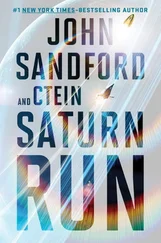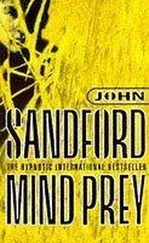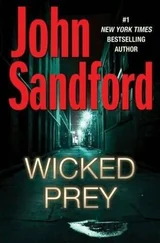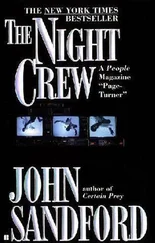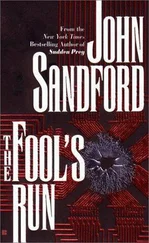Virgil said, “Even though you insulted me about my fish smell, I gotta say, that dress does good things for you.”
“I was afraid it made my ass look big,” she said.
“Ah, no, no,” Virgil said. Her ass was right at his eye level. “Not at all.”
Davenport nodded. “Virgil is correct. And observant.”
VIRGIL SLAPPED his thighs, stood up, and said, “Well, I’m gonna go chain-whip Sinclair. I’ll probably drag his ass down to the lockup. Mai, too. I gotta believe that Mai isn’t American, or even Canadian. She’s some kind of spy, and that means they gotta know something about these killings. We can hold them for a couple of days until we get something back from the State Department. Man, this is gonna hurt, picking her up.”
Weather finished with Davenport’s tie, patted him on the chest, and Davenport said, “Find Shrake and Jenkins-or see if Del’s around. Take some backup. Then go get these Vietnamese guys, too. Put them all inside until their status is figured out. They must be traveling on bad documents. We’ll get DNA from all of them. They’ll be a risk to run, so there won’t be any bail.”
“You think we need a warrant?”
“No. We’ve got probable cause,” Davenport said. “If they invite you in, you see anything lying around…”
“All right. Goddamnit. This-”
“Hey,” Davenport said. “You cracked it, man. Not even a week. What the fuck do you want?”
“Wash your hands before you go,” Weather said. “You don’t want to arrest somebody when you smell like a fish. There’s some Dove on the kitchen sink.”
“All right.” He moped off toward the kitchen.
Weather called after him, “Say, Lucas said you were taking a friend fishing up at the cabin. It wasn’t this Mai person, was it?”
“Ah, jeez…”
He started back toward the kitchen, heard Davenport mutter something to his wife, and he turned back and caught them suppressing smiles, and he asked, “What?”
“Nothing,” Davenport said.
“He said, ‘At least Virgil wasn’t the only one who got screwed,’” Weather said.
MAI AND PHEM sat in the back of Tai’s rented Toyota Sequoia, a huge tank of an SUV, and Phem unwrapped the rifle, pulling gently at the soft gray foam that had cushioned the weapon from road bumps and motor vibration.
Mai was looking at the target with a pair of night-vision glasses: there was enough ambient light to clearly illuminate the entire target area, and she could see the security men orbiting through the kill zone every few minutes.
“ Lot of guns,” she said in Vietnamese.
“Of course,” Phem said. “But they won’t expect our reach.”
Phem had the rifle free of its wraps: an accurized Ruger.338 bolt-action rifle in a black synthetic stock, with a twenty-four-inch barrel, and fitted with a new U.S. Army-issued third-generation starlight scope that had gone astray in Iraq.
Phem had worked up the gun himself, firing in a backwoods quarry in Michigan ’s Upper Peninsula. He could reliably keep the first round from a cold gun in a one-inch circle at two hundred yards, with the starlight scope. Not an easy thing.
The.338 was a powerful gun, chosen for its ability to bust through Level IV body-armor plates, the heaviest armor ordinarily worn. Phem had supervised the machining of the solid bronze slugs he’d be using.
Phem started to hum tunelessly, his body rocking a bit as he sat cross-legged in the dark, the rifle across his thighs.
Mai said, “Yama-you can do this.”
“Yes, but no more after this trip,” Phem said. “No more trips.”
“You know what these people did.”
“Of course. I wouldn’t have agreed if I hadn’t known; and also as a tribute to your grandfather. I would do anything he asked now,” Phem said. “In the future, maybe not. I might want to, but I think… sometimes, I think I couldn’t do it. My brain would boil up, and I’d be done.”
“Tai seems fine?”
Phem nodded and smiled. “Oh, Tai is always fine. He does his research and slips around like a ghost, and the life pleases him.”
“Well, be at peace,” Mai said. “You are working wonders.”
She went back to her glasses. At the bottom of the hill, past some oak trees and through a chain-link fence, three hundred and twenty-two meters away, as measured by a laser range-finder, she could see the front door of the country club: Republicans gathering to congratulate themselves on their preparations for the national convention.
“I haven’t seen Tai,” she said after a while, making conversation.
“You won’t until he gets back to the truck. He’s a ghost.”
THEY SAT IN silence as more people gathered, men in black and white, women in every color in the universe, laughing among themselves, kissing, hugging. Mai was amazed at her sex, sometimes, because of the female ability to enjoy power, status, position. Not the ingrown satisfaction shown by males, but an overt celebration, a genuine happiness.
“Do you expect to see Virgil?” Phem asked.
“I’m done with Virgil,” she said. She smiled at him in the dark and let her smile seep into her voice. “What are you asking, you old gossip?”
“Nothing whatever; we all know that the mission comes first,” Phem said.
“Ah, the mission. Well, I can tell you, Virgil got about as much of this mission as he could possibly tolerate,” she said.
Phem giggled. “I think he gave as good as he got. You seemed… your aura was very smooth when you returned.”
“You are worse than your mother,” Mai said.
“My mother…” Phem said, and his voice trailed away. Then: “When they find the electronics on the truck, they will be… amazed.”
“Who knows, maybe they’ll never find it,” Mai said.
“Oh, I think they will. If Sinclair is correct, Virgil is a smart man,” Phem said. “When you vanish, when the investigation is curtailed, he’ll begin to think. He’ll find it eventually.”
“He is smart, but not that smart, I think,” Mai said.
MAI LAY BACK in the truck and thought about the mission so far. If they had been sent simply to remove the men, there would have been no problem; but that’s not the way the mission had been briefed. Simple death would not have brought the necessary satisfaction.
Not to Grandfather, anyway.
The mission had begun to evolve after Chester Utecht had gotten drunk with several old friends, including one who’d long been paid by the Vietnamese government to keep an ear on the Chinese in Hong Kong. The informant-not a spy, but simply a man who listened, and who occasionally found an envelope with three or four thousand yuan under his door-had told a strange tale of a man who’d stolen a ship full of bulldozers at the end of the war, just before the final victory.
And with the theft, there’d been murder. The story came out of a drunken fog, and back in Hanoi had rung no bells at first. Instead, the story of the bulldozers and the murder circulated simply as a tale… and then an old man, high in the government, heard it. Heard it almost as a joke. Within a day, he’d followed the story back to its source and had identified Utecht.
The Vietnamese had no desire to disturb the sleep of the Chinese, and so they moved carefully, lifted Utecht, and visited him with a moderate amount of pain before the old man told the story again. But he had only two names other than his own; and one of those names was his son, a name he gave up in croaking horror and despair.
He’d been left in an alley, dead, and full of alcohol. There’d been no stir at all, no ruffle in the leaves of the Chinese peace.
The ear had gone to his funeral, with twenty thousand crisp new yuan in his pocket; had seen the younger Utecht, had chatted with him and taken down the details, and sent them along.
Читать дальше

